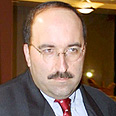
Dore Gold: Israel must prepare for different reality
Will Baker-Hamilton report change US view of Israel? Former UN ambassador says 'willingness of report's author to talk to Iran, Syria is a very alarming development'. Maj. Gen. (res.) Uzi Dayan: Israel shouldn't worry about report but rather lack of leadership and vision
The Baker-Hamilton report handed over to US President George W. Bush on Wednesday is being considered with the utmost severity in America. The majority of the report deals with Iraq, but a significant portion addresses the Israel-Arab conflict, which the report sees as the heart of the Mideast unrest.
So how will the report affect Israel? Former UN Ambassador Dore Gold says, "Israel will have to prepare for completely different reality." Maj. Gen. (res.) Uzi Dayan states that "the report shouldn't worry Israel. What should worry Israel is a lack of leadership and vision."
"The Baker-Hamilton report is indicative of a growing trend in both American parties," said Gold. "This approach sides with a US withdrawal from Iraq. Within two years American presence in Iraq will be minimal.
"Another thing, and this is more important, the very willingness of the reports' author to start a dialogue both Iran and with Syria, is an alarming development. It's alarming because the United States isn't requiring any preliminary conditions for this dialogue, and there is no mention of the Iranian nuclear program which continues to advance.
"The recommendation in this report, to talk to Syria and Iran despite the fact that they're responsible for the growing instability in Iraq, will only encourage them to continue employing their policies."
Gold says that "the report proves that Israel has been unsuccessful in conveying a clear message to the US elite regarding the Iranian threat. How can the United Stated see Iran as a stabilizing force in Iraq when Iran is funding and supplying arms to terror factions, both in Iraq and in Lebanon."
Gold saID that things will change both in short and long terms.
"In the immediate sense," he said, "the US will try to renew the political process as part of a general regional strategy."
He also pointed to several questions that arise from the report: "Will the US demand that Syria stop supporting terror? Will Israel be dragged into negotiations with those who will not even recognize it? Will America come to terms with the Iranian nuclear program?"
Bush between rock and hard place
"Israel has to take into account Iran's growing influence," said Gold, "and not only in Syria but also in Iraq and anywhere where there is a Shiite population operating on behalf of Iran."
Former National Security Advisor Maj. Gen. (res.) Giora Eiland also addressed the issue: "The report, if we look at the Israeli aspect of it, wants to see the Israeli-Palestinian conflict come to an end."
However Eiland said that the US doesn't want to pressure Israel beyond a certain point as, according to Eiland, President George W. Bush is caught between a rock and a hard place and he doesn't want to be perceived as a terror appeaser.
"The report – and this depends on how it is received by President Bush – hints that more weight should be given to the first part, the advancement of a solution to the Israeli-Palestinian conflict. It doesn't strategically change the Israeli reality," said Eiland.
Eiland's predecessor, Maj. Gen. Uzi Dayan, said that the report will "directly affect US strategy, not Israel. It speaks of US policies, the report shouldn't worry Israel. What should worry Israel is the lack of leadership and vision."
"The report calls for deeper American involvement. It basically says that the US should be more involved in the Mideast process.
"A country like Israel, a country with a strong economy and security, shouldn't fear American involvement. If we know how to use our strength, if we provide personal safety and if we know how to employ our economic strength (we shouldn't fear US involvement)."










